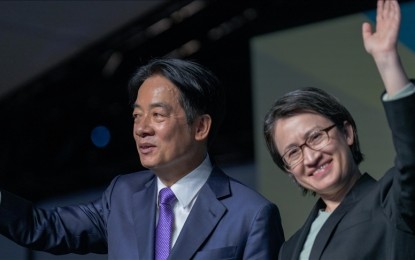
VICTORIOUS. President-elect Lai Ching-te (left) and Vice President-elect Hsiao Bikhim wave to the crowd in Taipei, Taiwan on Saturday (Jan. 13, 2024). Taiwan's presidential election is held every four years. (Anadolu)
ISTANBUL – China downplayed the victory of the ruling Democratic Progressive Party's candidate (DPP) in Taiwan's presidential election Saturday, claiming that the result "cannot represent the mainstream public opinion."
"The elections will not change the basic landscape and development trend of cross-Strait relations," said the spokesman for China's Taiwan Affairs Office, Chen Binhua, after William Lai Ching-te's election win.
Beijing's remarks came hours after incumbent Lai Ching-te, 64, won with around 40.5 percent in the election, with a turnout of 69.24 percent, resulting in an unprecedented third consecutive term for a political party.
Lai Ching-te was vice president for outgoing President Tsai Ing-wen.
However, the DPP faced decline in the country's Legislative Assembly, where it secured 51 seats, one short of the main opposition Kuomintang's 52, while the Taiwan People’s Party got eight.
Asserting China's claim on Taiwan, Chen said the election results "will not alter the shared aspiration of compatriots across the Taiwan Strait to forge closer ties, and will not impede the inevitable trend of China's reunification."
Beijing considers Taiwan as its "breakaway province" but Taipei has insisted on its independence since 1949, enjoying full diplomatic relations with 13 nations.
"Our stance on resolving the Taiwan question and realizing national reunification remains consistent, and our determination is as firm as rock," Chen said, according to a statement released on state media.
The DPP won the presidential elections, held every four years, for an unprecedented consecutive third term since 1996 when Taiwan held its direct polls to the island nation's top post.
Chen said Beijing "will adhere to the 1992 Consensus that embodies the one-China principle and firmly oppose the separatist activities aimed at 'Taiwan independence' as well as foreign interference."
For its part, China's Foreign Ministry released a statement calling the "Taiwan question" the country's "internal affair."
"The one-China principle is the solid anchor for peace and stability in the Taiwan Strait. We believe that the international community will continue to adhere to the one-China principle, and understand and support the Chinese people’s just cause of opposing 'Taiwan independence' separatist activities and striving to achieve national reunification," the ministry said.
The US and Japan welcomed Taiwan election results.
"We congratulate Dr. Lai Ching-te on his victory in Taiwan's presidential election. We also congratulate the Taiwan people for participating in free and fair elections and demonstrating the strength of their democratic system," US Secretary of State Antony Blinken said on X.
Tokyo was also quick in its response to the Taiwanese polls.
"For Japan, Taiwan is an extremely crucial partner and an important friend, with which it shares fundamental values and enjoys close economic relations and people to people exchanges," the Foreign Ministry said in a statement.
It added that Tokyo expects that the "issue surrounding" Taiwan will be "resolved peacefully through dialogue, thereby contributing to the peace and stability in the region." (Anadolu)
